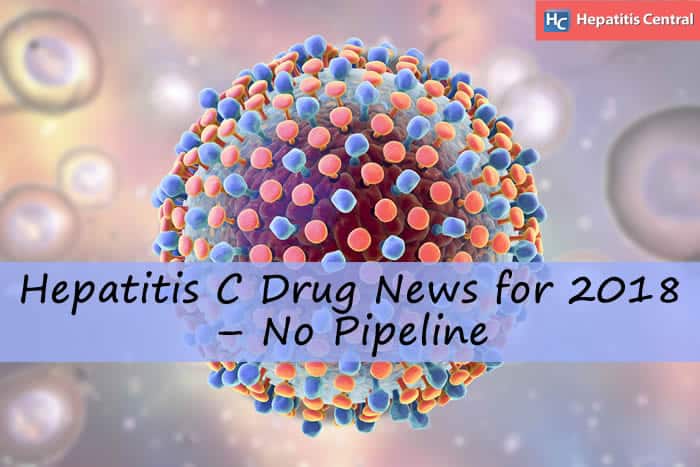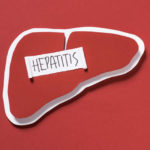Hepatitis C Drug News for 2018 – No Pipeline


The recent revolution in Hepatitis C treatment is responsible for curing approximately 95% of those who obtain treatment. Many infected are able to clear the virus from their body with relatively few side effects by taking a pill for a couple of months. Just six years ago, Hepatitis C treatment involved painful shots for half a year that caused severe side effects and was only about 50% effective. Thus, the progress made by the pharmaceutical industry in treating Hepatitis C is staggering.
The year 2017 witnessed a handful of new Hepatitis C drug approvals and heated competition in the drug development pipeline; however, it seems that research and development in this area has lost its fervor.
All with success rates in the high 90th percentile, the top nine, approved treatment options currently available for treating Hepatitis C include:
- Daclatasvir (Daklinza): Approved to treat Hepatitis C genotypes 1 or 3, this once daily pill is taken together with sofosbuvir (Sovaldi) and possibly ribavirin.
- Elbasvir and grazoprevir (Zepatier): This once daily pill treats Hepatitis C genotype 1 or 4, and it can be used for those who also have cirrhosis, HIV, late-stage kidney disease, and other hard-to-treat health conditions.
- Glecaprevir and pibrentasvir (Mavyret): One of the most recently approved medications, Mavyret is typically only needed for eight weeks for adults with all types of Hepatitis C who don’t have cirrhosis and who have not been previously treated. Mavyret was approved in August of 2017 and is the first drug used for all Hepatitis C genotypes.
- Ledipasvir and sofosbuvir (Harvoni): This once daily pill was the first interferon-free medication for people with Hepatitis C genotype 1. It is also used for genotypes 4, 5 and 6.
- Ombitasvir, paritaprevir, ritonavir (Technivie): A once daily pill for Hepatitis C genotype 4 without cirrhosis or with compensated cirrhosis – liver scarring that has not yet produced symptoms. Technivie is often prescribed with ribavirin and it may cause severe liver damage in people with advanced cirrhosis.
- Ombitasvir, paritaprevir and ritonavir, with dasabuvir (Viekira Pak): This combination is most effective for Hepatitis C genotype 1. This can be used with compensated cirrhosis, but it might cause severe liver damage in people with advanced cirrhosis.
- Simeprevir (Olysio) and sofosbuvir (Sovaldi): These two drugs are approved together to treat Hepatitis C genotype 1.
- Sofosbuvir-velpatasvir (Epclusa): Epclusa treats Hepatitis C genotypes 1 through 6 – with or without cirrhosis. It is used with ribavirin in those with decompensated (symptomatic) cirrhosis.
- Vosevi (Sofosbuvir, Velpatasvir and Voxilaprevir): Approved in July of 2017, Vosevi is the first daily, single-tablet regimen for patients with genotypes 1 through 6 who have been previously treated with sofosbuvir or other drugs for Hepatitis C that inhibit a protein called NS5A.
According to several reliable sources, the last of the Hepatitis C drugs in development have been discontinued before 2017 came to a close. Experts believe the absence of competitors for developing a better Hepatitis C drug means that this market has peaked.
Some evidence of this includes:
- Merck abandoned its two drugs in the Hepatitis C pipeline – MK-3682B (grazoprevir+ruzasvir+uprifosbuvir) and MK-3682C (ruzasvir+uprifosbuvir).
- Merck already markets Zepatier, which got off to a slow start after a launch early last year.
- Market leader Gilead has seen sales of its big Hepatitis C drugs, Sovaldi, Harvoni and Epclusa, fall sharply because of a shrinking numbers of patients being treated.
- Gilead’s Hepatitis C franchise declined over $1 billion from last year’s second quarter to this year’s second quarter.
- AbbVie launched Mavyret in August, costing $26,400 in the US for an 8-week course. This cost deeply undercuts Epclusa’s price of $74,760 for a 12-week course. According to analysts, this differential is likely to spark a price war.
- Janssen discontinued its Hepatitis C collaboration with Achillion in September of 2017.
- Bristol-Myers Squibb manufactures Daklinza (daclatasvir), but has recently bowed out of the Hepatitis C drug development game.
Although millions of people with Hepatitis C remain untreated worldwide, the market appears to no longer be growing. Curing Hepatitis C is a scientific milestone. Unfortunately, this feat also shrinks the market, leaving a declining fortune for the key players to go after. There are no Hepatitis C drugs in the pipeline for the start of 2018, but that does not mean an end to Hepatitis C progress. With nine viable treatments for this virus, the potential for affordability improves. We will be keeping our eyes open for developments in new drug therapies to cure or prevent Hepatitis C and for a drastic reduction in price.
Editor’s Note: For those who cannot afford treatment or who have completed treatment, taking supplements to protect, regenerate, and strengthen your liver is very necessary. If you wish to support your liver naturally, we recommend choosing a company that has been around for decades, complies with all FDA guidelines and good manufacturing processes, like Natural Wellness.
Special offer! Use code W-HCNR15 at checkout on Natural Wellness to save 15% on your order! Shop now.
https://endpts.com/the-hep-c-pipeline-shrivels-as-merck-dumps-two-next-gen-combos-boosting-leader-gilead/, The hep C pipeline shrivels as Merck dumps two next-gen combos, boosting leader Gilead, Retrieved December 31, 2017, Endpoints Company, 2017.
http://hcvadvocate.org/treatment/drug-pipeline-monthly-report/, HCV Advocate Monthly Pipeline Update, Retrieved December 31, 2017, Hepatitis C Support Project, 2017.
https://pharmaphorum.com/news/merck-axes-hepatitis-c-drugs/, Merck axes hepatitis C drug development, Retrieved December 31, 2017, pharmaphorum media limited, 2017.
http://raps.org/Regulatory-Focus/News/2017/11/06/28830/FDA-Finalizes-Guidance-on-Developing-DAA-Drugs-to-Treat-Hepatitis-C/, FDA Finalizes Guidance on Developing DAA Drugs to Treat Hepatitis C, Retrieved December 31, 2017, Regulatory Affairs Professionals Society, 2017.
http://www.gilead.com/research/pipeline, Pipeline: Liver Diseases, Retrieved December 31, 2017, Gilead, 2017.
https://www.hepmag.com/article/2017-hepatitis-c-treatment-pipeline, The 2017 Hepatitis C Treatment Pipeline, Retrieved December 31, 2017, Smart + Strong, 2017.
https://www.webmd.com/hepatitis/hepc-guide/understanding-hepatitis-c-treatment#3, The Latest in Hepatitis C Treatments, Retrieved December 31, 2017, WebMD, LLC, 2017.








5 Comments
I have been waiting for three years for treatments. Three appointments…one a police friend who took me to hospital and witnessed their incompetence…the appointment sent me to the wrong department! I am now very ill…visibly ill which I gather is quite dangerous. Wondering what course of action I can take? Or do I just get even worse…which makes me feel like an annoyance to the NHS and will likely cost more money to treat me…with a pill!
For Godsake ge5 the Tories out of power. They’re evil.
Why does NOT your ins. Cover meds 4 hep C? Get aggressive, learn what drug u need and go tell gastro to put u on it. I took Harvoni and called called called till they got tired of me, my PVP is the one who really ended up going gastro to order the MEDs
Yes I am incredibly ill daily from hep c too. Can barely do anything. Took harvoni which I bought online for 4 days and on the 4th day went out and had a heart attack. It made my heart struggle from day 1. If you have a slightly weak heart this medication that you can buy online FB may kill you. I presently want to get zaptier but this cannot be bought online. I do not want to die soon but feel I may due to body failure.
Wish you and me good luck. They should give us meds as we are suffering.
Hi Jamis! I waited almost 2 years for Harvoni! They kept telling me my liver didn’t have enough damage to qualify!! My insurance advisor told me to keep COMPLAING I was like Anne they got tired of me and finally they approved me in 2015!! I did 12 weeks of tx and was undetectable after 4 weeks & SVR at week 12 The tx. Had very little side effects!! GOOD LUCK!!
All thanks to Lab for making me turn negative of chronic hepatitis b, anyone suffering from this same virus or other deadly diseases should contact them on via whatsapp +27619522614